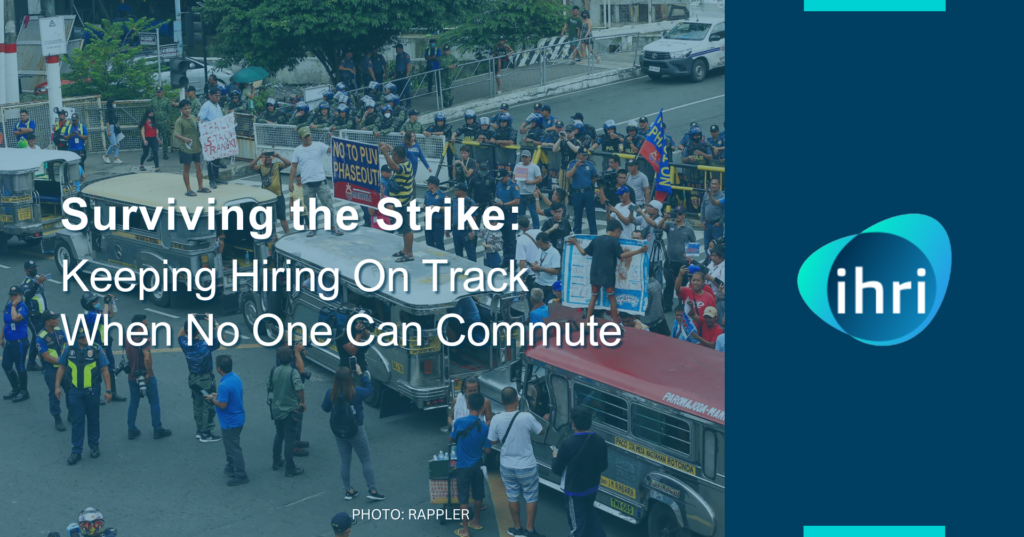The Manibela transport strike, scheduled for August 14-16, 2024, poses a significant challenge for employers across the Philippines. For recruitment professionals, the strike not only disrupts daily operations but also impacts ongoing hiring processes. However, with the right strategies, this disruption can be turned into an opportunity to showcase your company’s adaptability and commitment to candidates.
Here’s how to navigate recruitment challenges during the transport strike:
1. Embrace Virtual Interviews
With potential candidates facing transportation difficulties, now is the time to fully embrace virtual interviews. This not only helps maintain your recruitment schedule but also demonstrates your company’s flexibility and tech-savviness.
Actionable Tip: Ensure that your recruitment team is equipped with the necessary tools and training to conduct seamless virtual interviews. Communicate with candidates in advance to confirm their comfort with the technology being used.
2. Communicate Proactively with Candidates
Clear communication is essential to managing expectations during the strike. Reach out to all scheduled candidates to inform them of any changes or alternatives, such as rescheduling or switching to virtual interviews. Transparency during this period can enhance your employer brand.
Actionable Tip: Send personalized emails or messages to candidates explaining the situation and offering solutions, such as alternative interview dates or virtual meetings. This proactive approach reassures candidates of your professionalism and consideration.
3. Leverage Social Media for Outreach
With physical presence potentially limited, social media becomes an even more powerful tool for reaching out to potential candidates. Use your company’s social platforms to update followers about your recruitment process during the strike and to continue engaging with prospective talent.
Actionable Tip: Create posts that not only inform about the strike’s impact on your recruitment but also highlight your company’s commitment to accommodating candidates during challenging times.
4. Highlight Remote Work Flexibility in Job Listings
Given the potential for transportation issues, candidates are likely to be more interested in positions that offer remote work options. If your company supports remote or hybrid work, emphasize this in your job postings. This can make your openings more attractive to top talent who value flexibility.
Actionable Tip: Update your job listings to include details about your company’s remote work policy and how it supports work-life balance. This will not only attract more applicants but also align with current trends in the job market.
5. Enhance the Candidate Experience
The transport strike is a stressor for both candidates and recruiters. By going the extra mile to ease the burden on candidates, you can significantly enhance their experience. This might include offering alternative transportation solutions for in-person interviews or providing clear instructions for virtual setups.
Actionable Tip: Consider offering transportation allowances or arranging ride-sharing options for candidates who must attend in-person interviews. This small gesture can leave a lasting positive impression and set your company apart.
6. Monitor and Adjust Recruitment Timelines
Understandably, the strike may cause delays in your recruitment process. Be prepared to adjust timelines and communicate these changes to both candidates and hiring managers. Flexibility is key to maintaining momentum without sacrificing the quality of hires.
Actionable Tip: Regularly update your recruitment timeline and share it with all stakeholders. Ensure that any delays are communicated promptly to prevent confusion or frustration.
7. Use the Disruption to Assess Candidate Resilience
The ability to adapt to unexpected challenges is a valuable trait for any employee. The transport strike provides a unique opportunity to assess candidates’ resilience and problem-solving skills. How they handle the disruption could be a good indicator of how they might navigate challenges in the workplace.
Actionable Tip: During interviews, ask candidates how they’ve adapted to the strike and what strategies they’ve used to overcome transportation issues. Their responses can provide insight into their ability to handle adversity.
Conclusion
The Manibela transport strike presents an opportunity for recruitment teams to demonstrate flexibility, innovation, and a candidate-first approach. By adapting your strategies, you not only keep your hiring process on track but also reinforce your company’s reputation as a responsive and considerate employer.
In a competitive job market, how you handle disruptions like these can set you apart and attract top talent who value a company’s commitment to both its current and prospective employees.
Becoming an Expert
International HR Institute provides global certification programs for modern-day HR professionals. Understand how you can handle recruitment-related disruptions by taking the Certified Recruitment and Selection Professional certification program.


